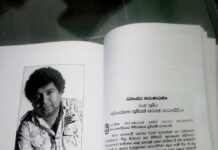‘I am very pleased to be here in Rome. You should know that, for us French people, the city of Rome, as well as all Italy, are places where one comes across almost miraculous characters.’ These are the opening words of Louis Althusser before the interview2 began, on one of the rooftops of Rome overlooking the cupola of San Pietro church of the Vatican. Preferring to be a behind-the-scenes, Louis Althusser, a Marxist theoretician, did not often give television interviews. Indeed this is a rare television interview he gave in April 1980, just weeks before he killed his wife Hélène. The interview was broadcast by Italian Radio Television RAI for the programme ‘Multimedia Encyclopaedia of the Philosophical Sciences’ by Renato Parascandolo, an Italian journalist, essayist and lecturer.
Journalist: How has Althusser become Althusser?
Althusser: But this is not of any interest….
Journalist: Can you explain your journey?
Althusser: My journey is very simple. I was born in Algeria. My mother was the daughter of alittle poor peasant from Movo, central France, who had decided to go to Algeria to work as a forest guard. My father was the son of an Alsacian3 , who chose to come to France in 1971, but the Government of France deported them to Algeria. And this is how my mother and father met each other. I lived in Algeria until 19804 . I then lived in Marseille for six years, and later in Lyon for three years. I joined the army for one year, then got imprisoned and sent to Germany for five years. I returned to France where I finished my studies in Philosophy in 1948. I stayed at the École Normale Supérieure as a professor.
Journalist: What about your intellectual and cultural journey?
Althusser: I encountered two men. The first one was Jean Guitton, who was a catholic philosopher, a friend of Pope Saint John XXIII and a close friend of Pope Paul VI. He helped me complete my dissertation. The other was a professor of history, whose name was Joseph Hours. He was a wonderful man. During the years 1936–1939, he talked to us about all that had happened: the war, the defeats, the miracle of Petain’s defeat. He explained how Petain had to come to power; he explained everything that has passed… wonderful. So I thought in these lines, considering that at the same time I was a Catholic, I had established a catholic circle [association] in the Lycée where I was studying; I was profoundly Catholic, and had two points of view. On the one hand, there was the church which called for considering and studying social problems with great respect And on the other, there was this history professor [Hours], a Catholic but Galatian–Jacobin; he would tell us about everything he was working on, an incredible world for its specificity. This is how I was shaped.
Journalist: In which moment did you become communist?
Althusser: I became communist because I was Catholic. I did not change religion, but I remained profoundly Catholic. I don’t go to church but this doesn’t matter; you don’t ask people to go to church. I remained a Catholic, that is, an internationalist universalist. I thought that inside the Communist Party there were more adequate means to realize universal fraternity. And then, there was the influence of my wife who had fought in the terrible resistance and who had taught me a lot, a lot. Everything has come to me through women, and this is the reason why I attribute a very important role, a predominant role, to the women’s movement. Women don’t know their capacity, the possibilities, their capability to do politics.
Journalist: What role does catholic culture have today?
Althusser: Oh… it has a giant role. In my view, today social revolution or a profound social change depends on the alliance between Catholics (I am not saying the church, though the church can also be part of it), the Catholics of the world, all religions of the world, and communists.
Journalist: Regarding science and humanism: you have criticized the thought of young Marx saying that he could not do philosophy without establishing the basis of science. Now you are in the footsteps of Marx’s Capital, establishing a Marxist philosophy. Is there a Marxist philosophy?
Althusser: Marxist philosophy does not exist, and it cannot exist. I mentioned this a long time ago, two months after I wrote a brief introduction for the Italian edition of Capital. After the publication of the book, I understood that almost everything was wrong. Finally one had to talk about the Marxist position within philosophy, but not of Marxist philosophy. Now, I am sure – and I am speaking with the experience of 15 years – that a Marxist philosophy is impossible to exist, just impossible.
Journalist: Can dialectical materialism not exist either?
Althusser: They are the same thing, even worse…
On communism…
Journalist: The word ‘auto-determination’ refers to the word ‘communism’?
Althusser: Well, not for me…
Journalist: What is the difference?
Althusser: Because the word ‘auto-determination’ does not have until now any substance/content. On the other hand, communism exists. Auto-determination does not exist, but communism does. For example, it exists among us here on this rooftop of Rome.
Journalist: In what sense?
Althusser: Communism is a mode of production where there are no economic relationships of exploitation nor any political relationships of domination. Neither are there ideological relationships of intimidation or pressure, nor of ideological enslavement. And here among us these relationships do not exist.[LIKE X]
Journalist: Among us here, in this very moment?
Althusser: Yes, in this moment. There are islands of communism everywhere across the world, for example: the church, certain trade unions, also in certain cells/units of the Communist Party. At my Communist Party we have a cell/unit which is communist; it means that communism has been realized… Look at how football is played, what happens… It is not about market relationships, it is not about political domination, it is not about ideological intimidation. There are people from [different] teams that oppose each other, they respect the rules, that is, they respect each other. Communism is the respect for humankind.
Journalist: What is the difference between respect and love?
Althusser: There is a great difference. Look at the church. When Christ said that you have to love your neighbour, love turns into an order; an order according to which, by including the other, you have to love the neighbour as yourself. But I don’t want any order. Whereas respecting the other is something that belongs to you. If you say that you have to love others, the other becomes involved in your love, he cannot escape. And if he doesn’t care about (for) your love, what can he do. What do you do if you insist: ‘I have to love you, I have to love you because Christ asked me to”? You run away. But if you have respect for the other, then he will leave you to do whatever you want. If he wants you to love him, then it’s fine. But if he doesn’t, it’s also fine. If you love him, you try to explain to the other that you love him, but if you don’t love him do whatever you like.
Journalist: Lenin said that between anarchists and Marxists there were nine-tenths of identity and only one-tenth of difference; that communists wanted the extinction of the state and anarchists wanted its immediate abolishment. Do you agree?
Althusser: Yes, I agree. I am an anarchist, a social anarchist. I am not a communist, because social anarchism is beyond communism.
Journalist: Why has it broken down, this cultural unification between anarchism and communism?
Althusser: This is very dramatic history. You know that in the relationship of Marx and Bakunin there was the story of the prepotent traits of Marx’s personality. It is a terrible story, just terrible. I want to say that Marx has treated anarchists in an impossible way, unjustly. This has resulted to a resentment of the masses that you cannot absorb as such from one day to another. These are things that last, just like when you have been badly treated by the other, you would need to be Christ in order to speak to him again; you cannot forgive, nor can you forgive for others. How can you violate people like this and have no respect for them, like Marx did to Bakunin?5 Bakunin was a little crazy, but this doesn’t mean anything. We have many crazy people everywhere; I am also crazy.
On revolution…
Journalist: Let’s speak for the revolution in the West. What are the historical conditions today in order for a revolutionary process to emerge in the West today?
Althusser: This is a very difficult question that goes beyond our field of research. It’s very difficult. For instance, let’s take the situation in Italy which is blocked, as well as in France. However, in my opinion, it is more blocked here in Italy than France, although this is more of a hypothesis. Lenin has provided the general conditions. It is always true that those who are at the top cannot govern anymore, and those who are at the bottom cannot continue to be governed like this anymore. [This] is a condition. But this condition does not exist yet. People who are at the top cannot anymore govern, this is true; but people who are at the bottom – workers, peasants, intellectuals, etc – are still able to support the existing regime; they still support it. It is enough to say that when a regime is rejected by those at the bottom, then the revolution will break out.
Journalist: So, you say that the eruption of the socialist revolution will happen only thanks to the crises of the capitalist modes of reproduction?
Althusser: Capitalist modes of reproduction are always in crisis. It is Marx’s definition of capitalism, that is, capitalism is always in crisis; in other words crisis is normal for capitalism.
Journalist: You say that ideological state apparatuses are very important structures for domination of one class…
Althusser: Yes, I do. But I emphasize ‘…of the state’, and this is a problem, because everyone is used to the term ‘ideological apparatuses’. I did not know that Gramsci had used the term ‘hegemonic apparatus’; it is the same thing, only that ‘the state’ disappears. I am very careful on keeping ‘the state’, because it is the most important thing: these are ideological apparatuses of the state. Of course, it depends a lot on the definition that you give to the state. You have to give another definition to the state, instead of the classic definition given by Marx, because Marx did not understand anything about the state. Yes, he understood that [the state] was an instrument of the dominant class, this was right, but didn’t understand anything with regard to the functioning of the state, or let’s say the space of the state.
Journalist: For example, Gramsci too spoke about newspapers, noting that regardless whether they are public or private, [newspapers] are nevertheless hegemonic apparatuses.
Althusser: Yes, I do agree completely.
Journalist: Now, the apparatuses of reproduction are not limited to the means of mass communication, such as parties, trade unions, and families. For instance, factories too produce certain apparatuses of reproduction (e.g. hierarchy, career, etc.)
Althusser: Oh, yes, yes, of course. I didn’t speak about this, but it is correct.
Journalist: You are known, above all, for the creation of a new notion – ‘overdetermination’. Can you explain this concept?
Althusser: I developed this concept through Freud. And I used it in a theoretical field that doesn’t have any connection with Freud. Currently, you cannot establish any relationship between the thought of Freud and Marx, except in the relationship to philosophy, that of philosophical analogy – materialism, and so on. I used it to talk about various things in reality of society, historical events. [The concept] is not always encountered as ‘determination’, but also as ‘overdetermination’ or ‘underdetermination’. This is not simple, but in plural; in this plural, there is a plural in more or in less of ‘determination’ that you think, or that you believe that you think, that you believe you obtained of your research.
Journalist: Can you give an example?
Althusser: For example, the case of Stalin. A very ‘overdetermined’ case. The explanation that Khrushchev gave, in short, was that Stalin was crazy. He became crazy. This is a ‘determined’ explanation. But, it is more than clear that it is insufficient; that this explanation is not enough to understand the personality and the world of Stalin. Other ‘determinations’ are needed – ‘overdetermination’ and ‘underdetermination’ – because when you believe that you have understood the pillars of ‘determination’, you don’t know where exactly you are in reality, in front of reality, it can be that you are over-reality or under-reality. You should go up, beyond, or under.
Journalist: ‘Over-reality’ means that you are forward in respect to reality?
Althusser: It means that, in general, you are late in reality. It may happen that in certain situations – for example, poets, musicians, and utopian philosophers, are ahead of reality. For instance, here [on the rooftop], we are certainly late in reality. Absolutely. Because we do not recognize [reality], we only try to recognize it.
Journalist: We are underdetermined?
Althusser: Yes, underdetermined.
Journalist: Ernest Bloch said that the destiny of man is to be always anachronistic, to live always before their history, or to live their own history by thinking as they were thinking 20 years ago, or one century ago.
Althusser: Yes, they are always late. It’s true, but he did not help. He was speaking for others, not for himself.
Politics
Journalist: Your method of work is to study, no…
Althusser: I tend to do that; I consider it the most important thing for everything. I think that the word ‘order’ is the number one word. Then, the change of thinking, change in the way of thinking; and then, afterwards, change in the way you act. This means change the way to organize, to mobilize, to make others understand things, to encourage people to act, to organize actions in trade unions, in politics, and so forth.
Journalist: This means to change also the way of doing politics. What is politics?
Althusser: What is politics? [Laughing]. To act for freedom and equality.
Journalist: What does it mean to know how to do politics, for example?
Althusser: It means to be conscious of the real relationships between men who have ideas about politics and other things.
Journalist: You once used a metaphor that said ‘to know how to do politics, you need to know how to play the piano’. What does it mean?
Althusser: Yes, it was Mao’s words. I explained it in an article which will be published… it is not necessary to repeat it today.
Journalist: Another story that you have told is that of the oak tree and donkey…
Althusser: Well, that is a very simple story. I have been told that Lenin told this story when he was in Switzerland. He tried to explain to people that they needed to change their way of thinking. The story goes like this. It takes place in Russia, in a rural, semi-deserted area. Around 3 o’clock in the morning, a man named Ivan is awakened by strong knocks on the door, while sleeping at his home. He wakes up, goes to the door to see what is happening. At the door he finds a young man called Gregori who is screaming: ‘There is a horrible thing, horrible… please come with me.’ The young Gregori takes Ivan to a field, in the center of which there is a magnificent tree, an oak tree. It is night and one cannot see very well. Young Gregori says: ‘Do you know what they did to me? They gave back my oak tree to the donkey.’ But the fact remains that a donkey was tied up around the oak tree. and Ivan responds: ‘You are totally crazy, Gregori. It’s enough to change your thinking. Don’t say that they tied up the oak tree to the donkey, but that they tied up the donkey around your oak tree instead.’
Journalist: I don’t have any questions to do unless you have to say something.
Althusser: Can we go to the beach? It is a beautiful day.
The last minute of the interview, which has not been translated here, is a brief dialogue between the journalist and Althusser. Althusser is curious about the cupola of the church he was seeing from the terrace, which is, in fact, the cupola of San Pietro church of the Vatican. When the journalist explains to him that the cupola is the place where the Pope lives, Althusser says that he is ready to go and visit the Pope at any time – during the day, night, winter, and summer – encouraging the journalist to join him.
1This interview was conducted for a television program. Many sentences are cut off in the middle and are sometimes confusing. In transcribing this interview, we have tried to remain as faithful as possible to the original version.
2The original interview can be watched here: http://bit.ly/AlthusserInterviewRAI
3Translator’s note: a person from Alsace region.
4Althusser makes a mistake when he speaks about the year in which he moved to France and when he finished his studies. We don’t know whether this is due to the language barriers. However, Althusser’s father moved his family to Marseile in 1930. He finished his diplôme d’études supérieures in 1947, under the direction of Gaston Bachelard.
5Translator’s note: In the interview, Althusser says ‘Bukharin’ instead Bakunin. It might have been a mistake by Althusser since he was speaking about the tensions between Marx and Bakunin, and not Marx and Bukharin. Moreover, Bukharin was born on 1888, whereas Marx died in 1883, showing how any tension between Marx and Bukharin was not possible.
Translated by Ron Salaj



















